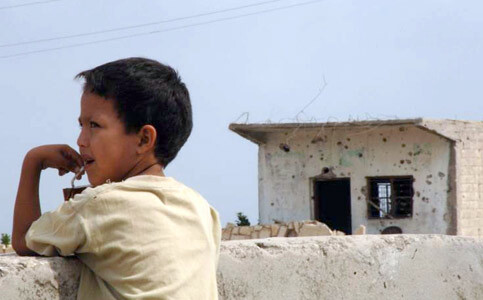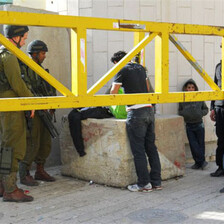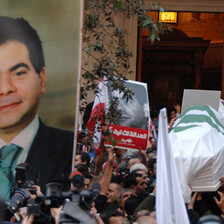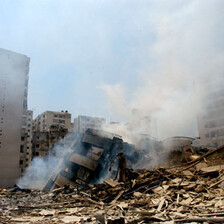Electronic Lebanon 7 October 2006

A boy stands at a wall near a bomb-riddled building in the southern Lebanese village of Marwahin, 20 August 2006. (Dina Debbas/IRIN)
The “Solidarity with Israel” and “Free Lebanon” rallies have quieted, and a combustible mixture of grief, fear, and anger hangs like an ugly cloud over the rubble and ruin.
David Grossman, the acclaimed Israeli novelist and peace advocate, grieves for his son, who was killed in Lebanon two days before the cease-fire. Across the border, the people of Qana mourn their dead, the families crushed during an Israeli airstrike.
President Bush, blinded by ideology, abdicates any attempt at statesmanship. He contends that Israel “won,” equating Hamas with Hezbollah with Al Qaeda with Syria and Iran. Hezbollah’s Hassan Nasrallah looks like a hero in the Arab world, as the shaky Lebanese democracy staggers under the chaos wrought by massive Israeli destruction.
As Israelis emerge from their bomb shelters and their shattered sense of security, they count 154 dead, 422 wounded, and a military embroiled in controversy. As the Lebanese survey their crumpled bridges, airports, and apartment blocks, they too grieve for thousands dead and injured and hundreds of thousands displaced from their homes.
In Gaza, 228 Palestinians were killed, 720 injured. The main power station was bombed; homes and businesses have no electricity or water; the medical system has collapsed; children are starving.
Are we any closer to the release of the captured Israeli soldiers or the disarming of resistance groups? To add to this tragedy, the United Nations now reports that up to 1 million cluster bomblets failed to explode and lie buried on Lebanese soil, most fired by Israel during the final 72 hours of fighting.
This brings the controversy painfully home. Not only did the United States manufacture many of these cluster bombs and supply them in violation of the Arms Export Control Act, but there is increasing evidence that the Bush administration was forewarned and enthusiastic about the conflict, provided weaponry and political support to Israel while ignoring diplomatic options, and showed little interest in a cease-fire.
Ultimately, this was our war, waged for US interests; a proxy war fought by Israel, testing US weaponry and strategy in the Bush buildup to a confrontation with Syria and Iran, supported not only by the usual neoconservatives but the entire Congress. Tragically, this was also a conflict in which Jewish organizations with powerful political influence presented a voice of unqualified support despite a growing Jewish dissent.
Remember the invasion of Lebanon by Israel, which led to years of occupation and the growth of Hezbollah, or the crushing occupation of the West Bank and Gaza, which gave birth to Hamas in the 1980s?
What kind of strategy destroys the infrastructure of a fragile democracy in Lebanon in the name of strengthening it, or humiliates and starves an entire people in Gaza and imprisons much of its leadership in the hopes that the people will resist their own democratically elected government?
While Hamas and Hezbollah clearly engage in provocative and inhumane behavior, have we lost all sense of causality or proportionality? Has “shock and awe” been so successful in Iraq that this foreign policy is now going to be applied throughout the region?
With serious questions being raised about the all-powerful Israeli military, with an enormous humanitarian and political catastrophe facing Gaza, with Lebanon struggling over a massively damaged infrastructure and an environmental calamity along its oil-soaked shores, the diplomats are starting to talk.
Ultimately, these tortured conflicts demand negotiated solutions that attend to all the bloody historical and political details. This includes resolving the Israeli occupation of the West Bank and Gaza, which undermines Israel’s international legitimacy and maintains Israel’s enemy status in much of the Arab world.
Resolving the conflict with the Palestinians as well as with Syria would be a critical strategic move for Israel and open the possibility for isolating fundamentalist Islamic regimes that challenge Israel’s existence.
It is too dangerous to lump the Middle East conflicts into a war on terrorism, it is too costly and self-defeating to continue to ignore the varied injustices that fuel these clashes. This latest conflagration has only shaken Israeli confidence, alienated international support for Israel, and created a new generation of wounded, angry Arabs, proving once again the bankruptcy of US-Israeli foreign policy and the pressing need for active, balanced diplomacy.
Alice Rothchild is a longtime activist in women’s and health care issues and has devoted the last ten years to the Israel/Palestine conflict. Her op-eds have been published by The Boston Globe and one in The Baltimore Sun and she will be publishing a book, Broken Promises, Broken Dreams: Stories of Jewish and Palestinian Trauma and Resistance, in March 2007, Pluto Press. This op-ed was originally published by the Boston Globe on 30 September 2006 and is republished with the author’s permission.





